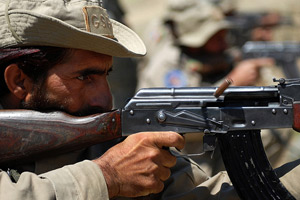Gun-carrying contractors working for the Defense Department now account for between 22 and 30 percent of the total armed force in Afghanistan, according to a new report [PDF] by the Congressional Research Service. And between June and September 2009, the number of armed security contractors in the country spiked by more than 100 percent. This sharp increase is likely to continue as the Obama administration deploys 30,000 more troops to the country.
The figures reported by CRS are limited to armed contractors employed by the Pentagon in Iraq and Afghanistan (see my former MoJo colleague Justin Elliot for a good rundown of the numbers). In Afghanistan, factoring in security contractors employed by other US agencies (namely USAID and the State Department), and those working for corporate clients, NGOs, and foreign governments, the ratio of armed contractors to US troops is vastly higher. By some estimates there are as many as 70,000 security contractors working in Afghanistan, as compared to 68,000 US troops currently on the ground, a large percentage of them serving in a support, not a combat, capacity. The truth is that no one is quite clear on how many security contractors are actually working in Afghanistan—not even the government agencies paying their salaries, a fact the GAO has highlighted [PDF] in the past.
Many of the armed contractors in Afghanistan are locals who work for companies that are effectively illegal—they operate unlicensed and outside of the regulatory framework overseen by the country’s Ministry of Interior. Here, the term contractor applies loosely—many are just dudes with guns attached to local militias or associated with provincial powerbrokers who have set up their own private security companies (PSCs). According to CRS, “Many analysts believe that regulations governing PSCs are only enforced in Kabul; outside Kabul there is no government reach at present and local governors, chiefs of police, and politicians run their own illegal PSCs.” These illegal operations serve various clients, including, the CRS report notes, “NATO and the U.S. Government.” This means that as the US and NATO are actively pushing to strengthen Afghan governance, they are simultaneously empowering players who are flouting Afghan law.
The CRS report also states pretty plainly that the conduct of security contractors has damaged the US mission in Afghanistan and Iraq:
Abuses committed by contractors, including contractors working for other U.S. agencies, can also strengthen anti-American insurgents. There have been published reports of local nationals being abused and mistreated by DOD contractors in such incidents as the summary shooting by a private security contractor of an Afghan who was handcuffed, the shooting of Iraqi civilians, and the abuse of prisoners at Abu Ghraib prison in Iraq. (It should be noted that there have also been reports of military personnel abusing and otherwise mistreating local nationals, including the abuses that took place at Abu Ghraib prison. CRS has not conducted an analysis to determine whether the incidence of abuses is higher among contractors than it is among military personnel.)
Many of the high-profile reports of PSCs shooting local nationals or otherwise acting irresponsibly were committed by contractors working for the Department of State. Some of these incidents include the reported shooting of Iraqi civilians by Triple Canopy employees, the shooting of 17 Iraqi civilians at a Baghdad traffic circle in Nisoor Square by Blackwater employees, and the recent controversy over the behavior of security contractors from Armour Group who were hired to protect the U.S. embassy in Afghanistan. Of the six incidents listed above, five were committed by U.S. companies and U.S. nationals.
According to many analysts, these events have in fact undermined the U.S. mission in Iraq and Afghanistan. An Iraqi Interior Ministry official, discussing the behavior of private security contractors, said “Iraqis do not know them as Blackwater or other PSCs but only as Americans.” One senior military officer reportedly stated that the actions of armed PSCs “can turn an entire district against us.” Some analysts also contend that PSCs can be a direct threat to the legitimacy of the local government. These analysts argue that if counter-insurgency operations are a competition for legitimacy but the government is allowing armed contractors to operate in the country without the contractors being held accountable for their actions, then the government itself can be viewed as not legitimate in the eyes of the local population. These analysts point to the recent court decision dismissing the case against former Blackwater employees as a case in point where the legitimacy of the U.S. and local government is being undermined by the actions of PSCs.
The perception that DOD and other government agencies are deploying PSCs who abuse and mistreat people can fan anti-American sentiment and strengthen insurgents, even when no abuses are taking place. There have been reports of an anti-American campaign in Pakistan, where stories are circulating of U.S. private security contractors running amok and armed Americans harassing and terrifying residents. U.S. efforts can also be undermined when DOD has ties with groups that kill civilians or government officials, even if the perpetrators were not working for DOD when the killings took place. In June 2009, the provincial police chief of Kandahar, Afghanistan, was killed by a group that worked as a private security contractor for DOD.
Despite the role contractors may have played in setting back US efforts, don’t expect the US to end its reliance on them anytime soon. According to CRS, “Many analysts and government officials believe that DOD would be unable to execute its mission without PSCs.” The same is surely true of the other agencies working in Iraq and Afghanistan.
Follow Daniel Schulman on Twitter.
















